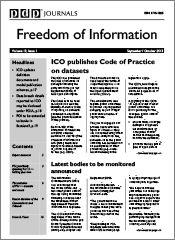FOIMan explains why some truths we cling to about the UK’s FOIA are not quite what they seem.
 A few months ago I was delivering some FOI training to a local authority (always available at competitive rates, folks!). I was explaining how far council officers were expected to go when searching for information to answer an FOI request. In particular I stated that if it was known that information had been deleted but still potentially existed on a backup, the backup should be searched.
A few months ago I was delivering some FOI training to a local authority (always available at competitive rates, folks!). I was explaining how far council officers were expected to go when searching for information to answer an FOI request. In particular I stated that if it was known that information had been deleted but still potentially existed on a backup, the backup should be searched.
The council’s FOI officer cautiously picked me up on my assertion. They had, they told me, had a written statement from the Information Commissioner’s Office (ICO) that contradicted me. So surely I was wrong?
The truth is that despite what we are often led to believe, there are some aspects of FOI law that are not certain. The legal system has not yet settled on the ‘right’ answer. This is the case when it comes to debates about information held on backups and whether it is considered held. In the example above, neither I nor the ICO are technically wrong; but then strictly speaking we’re not right either. We’re both interpreting the existing law, and both interpretations are arguable.
This is because English law revolves around the concept of precedent. But precedent can only be set by courts that make a decision beyond a certain stage. In a recent Upper Tribunal decision (LO v Information Commissioner, [2019] UKUT 34 (AAC) (29 January 2019)), Judge Jacobs was critical of the Information Commissioner for treating decisions of the First-Tier Tribunal (FTT) as ‘authoritative statements of the law’. Strictly speaking, they’re not. When it comes to backups, we only have rulings of the FTT to go on, so there is no definitive answer yet on that issue. Interestingly, on this issue, the ICO choose not to accept the FTT’s approach without question in their guidance.
My latest piece for PDP’s Freedom of Information Journal – What we don’t know (which you can access here) – looks at this issue in more depth – looking at the backups query, but also a couple of other questions which have not yet been answered definitively – perhaps surprisingly. You’ll see that there are disputes between the ICO, the FTT and the s.45 Code of Practice which will only be resolved if those matters reach the Upper Tribunal. It ends by asking what questions you may have about FOIA or the EIRs – as I’ve mentioned before, we’d like to answer some of your conundrums in a future issue of the Journal.



Good Afternoon Paul, I recently read that the majority of requests for information directed to a planning department are considered as EIR’s. I understand the logic behind this decision however it poses some questions. It would be unreasonable to direct a planning FOI (EIR) to our environmental protection team as they will not be able to answer the questions. Where is the line between what is an FOI for planning and what is an EIR or is this again something that requires slight speculation, has the UT made a decision on this? It also brings in the issue of what is considered a paid EIR and what is not when planning information is requested, again has this been decided by the UT or is it open for interpretation. Our authority charges for certain EIR requests. However; if every planning request is an EIR and not an FOI then where is the line for what we charge for and what we don’t? how do we decide what is and isn’t a EIR for the purposes of planning information.
John, thanks for the query and for a detailed explanation of when a request should be dealt with as an EIR request and for when you can charge, please take a look at the articles at https://www.foiman.com/resources/foimans-guide-to-the-eirs where I go over this in detail. There’s also a more in depth explanation in chapter 5 of my book. I’m not sure I understand why an EIR would require you to direct a request to a particular team. Whether it is FOI or EIR you should be getting the team that is best placed to answer the request to collate the information – it doesn’t matter which legislation applies.
Pingback: FOI Man: What we don’t know about FOI | opendatastudy
In your latest post about FTT and UT decisions, I note your comments:
“Judge Jacobs was critical of the Information Commissioner for treating decisions of the First-Tier Tribunal (FTT) as ‘authoritative statements of the law”
and
“which will only be resolved if those matters reach the Upper Tribunal”.
Could you confirm whether FTT decisions are not precedent-setting but UT ones are? Where is this stated and could you direct us to any guidance on this?
Thanks for your advice
Hi Debbie
Thanks for your question. First of all, I’d refer you to the statements of Judge Jacobs himself at para 17 of the decision I mentioned (which can be viewed at https://www.bailii.org/uk/cases/UKUT/AAC/2019/34.html ), where he states this clearly. The idea of judicial precedent, and the significance of decisions taken at various levels of the judicial system, is one which is well-established and set out in many legal textbooks (see, for example, Holland & Webb, Learning Legal Rules, a commonly used textbook on law courses) – it’s not something that is only important in an FOI context. As always, I’m not a lawyer!